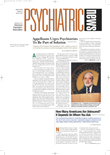The world is growing smaller as far as psychiatry is concerned. This trend is probably not surprising, considering the ease of 21st-century air travel and communication through the Internet.
A prime example was found in a workshop held at APA’s 2003 annual meeting in San Francisco last month titled “International Psychiatric/Psychopharmacological Organizations’ Collaboration.”
Leaders of some of the world’s most prominent psychiatric organizations came together to describe their organizations’ activities and to discuss possible collaboration. The leaders included outgoing APA President Paul Appelbaum, M.D.; incoming APA President Marcia Goin, M.D.; Herbert Meltzer, M.D., president of the Collegium of Internationale Neuropsychopharmacologium; Yves LeCrubier, M.D., president of the European College of Neuropsychopharmacology; Carlos Hojaij, M.D., president of the World Federation of Biological Psychiatry; and John Cox, M.D., secretary general of the World Psychiatric Association.
What’s more, such organizations themselves are involving an increasing number of the world’s psychiatrists and psychiatric investigators.
For instance, about a third of the psychiatrists who attended this year’s annual meeting in San Francisco—some 6,000 psychiatrists—hailed from countries other than the United States, Appelbaum reported. The Diagnostic and Statistical Manual of Mental Disorders has become something of a world standard for psychiatric diagnoses, he said, and APA is the largest publisher of psychiatric books in the world.
Although the European College of Neuropsychopharmacology has only about 700 members, some 5,000 neuropsychopharmacologic researchers attended its last conference, LeCrubier said. What’s more, the college holds workshops, where it particularly tries to further the efforts of young scientists.
Before he was secretary general of the World Psychiatric Association, Cox was president of the Royal College of Psychiatrists in the United Kingdom. That organization is also becoming more international, Cox said; it has some 11,000 international members.
Finally, these organizations are attempting to bring more and more psychiatrists and psychiatric researchers from various countries into their fold or at least to reach more and more of them.
For example, the Collegium of Internationale Neuropsychopharmacologium, which currently has some 900 members, is trying to recruit more from developing countries. It also holds regional conferences, for example, in South Africa or the Middle East, that are convenient for neuropsychopharmacologic scientists in those areas to attend.
The World Psychiatric Association, Cox explained, is likewise encouraging the involvement of more psychiatrists throughout the world—not just via congresses, education, research, and scrutiny of psychiatric abuse in various world regions, but via a new journal, World Psychiatry. ▪
